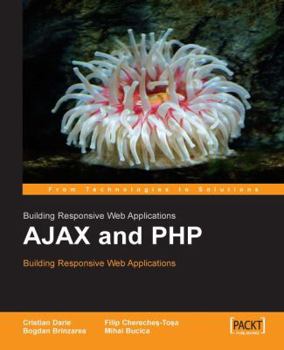AJAX and PHP: Building Responsive Web Applications
Select Format
Select Condition 
Book Overview
Customer Reviews
Rated 5 starsIt's Much More than AJAX and PHP
I admit, when I first opened this book, I thought it would contain a dry discussion of how to use AJAX methods with PHP. But the book turned out to be so much more than advertised, I think its title must be wrong. It should have been called, "How to Use AJAX Methods with PHP, MySQL, DOM, CSS, SVG, XSL, XML, RSS, and JavaScript Frameworks." I certainly never expected to read it cover to cover, but that's what I did. In...
0Report
Rated 5 starsAJAX and PHP by Example
This book teaches by example. The first few chapters introduce AJAX and what part PHP, Javascript and XML all play. Then the remainder of the book takes you through several example applications. The example apps are simple enough that you can easily follow. These applications include Form Validation, Chat, Suggest and Autocomplete, Charting with SVG (Scalable Vector Graphics), using grids, and Drag and Drop. Each example...
0Report
Rated 5 starsJust what I needed
Ajax and PHP came at exactly the right time in my self-inflicted education as I am just now gaining functional literacy in OOP, Client/Server. PHP, CSS et. al.. There are a lot of things to like about this book, starting with its organization. It starts off by documenting what you need to know to best use of this book. And supplies the URL/Hyperlinks to get those literacies if you don't have them. (Thank you!) It achieves...
0Report
Rated 5 starsSolid package bundled with great AJAX and PHP code
If you are a PHP programmer who is looking to start integrating AJAX in your upcoming projects, then this book will be a perfect start for you. The book focuses more on code rather than theory, and explains the pile of code in an easy manner. The book starts with a great chapter explaining how web evolved and why the need for AJAX was created. It then explains what AJAX is and how it works - a difficult task to explain to...
0Report













